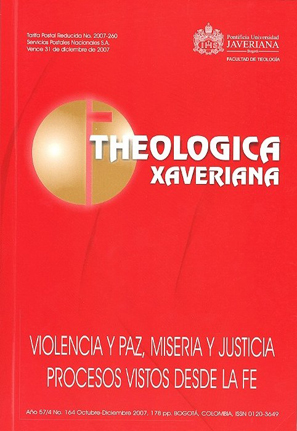Resumen
El proceso de paz de Colombia vuelve a encallar por las dificultades de entablar una conversación y por las deficiencias de las herramientas jurídicas. Pero lo que explica esas fallas es una crisis grave de la ética. Al mirar el detalle se advierte que la proliferación de la masacre demuestra un grado alto de deshumanización. Lo que N. Bilbeny llamó la idiotez moral: la banalización del mal. Se explora aquí una vía de salida del callejón, en apariencia ciego, a través del atajo de una propuesta que hace Juan XXIII en su carta encíclica Pacem in Terris, PT, y con la cual concuerda E. Morin en su reflexión sobre la ética. Este último dice: “Amen para vivir y vivan para amar.” El Papa remite al amor, a Cristo, quien dejó en su testamento a sus fieles amigos la misma recomendación.
Esta revista científica se encuentra registrada bajo la licencia Creative Commons Reconocimiento 4.0 Internacional. Por lo tanto, esta obra se puede reproducir, distribuir y comunicar públicamente en formato digital, siempre que se reconozca el nombre de los autores y a la Pontificia Universidad Javeriana. Se permite citar, adaptar, transformar, autoarchivar, republicar y crear a partir del material, para cualquier finalidad (incluso comercial), siempre que se reconozca adecuadamente la autoría, se proporcione un enlace a la obra original y se indique si se han realizado cambios. La Pontificia Universidad Javeriana no retiene los derechos sobre las obras publicadas y los contenidos son responsabilidad exclusiva de los autores, quienes conservan sus derechos morales, intelectuales, de privacidad y publicidad.
El aval sobre la intervención de la obra (revisión, corrección de estilo, traducción, diagramación) y su posterior divulgación se otorga mediante una licencia de uso y no a través de una cesión de derechos, lo que representa que la revista y la Pontificia Universidad Javeriana se eximen de cualquier responsabilidad que se pueda derivar de una mala práctica ética por parte de los autores. En consecuencia de la protección brindada por la licencia de uso, la revista no se encuentra en la obligación de publicar retractaciones o modificar la información ya publicada, a no ser que la errata surja del proceso de gestión editorial. La publicación de contenidos en esta revista no representa regalías para los contribuyentes.


